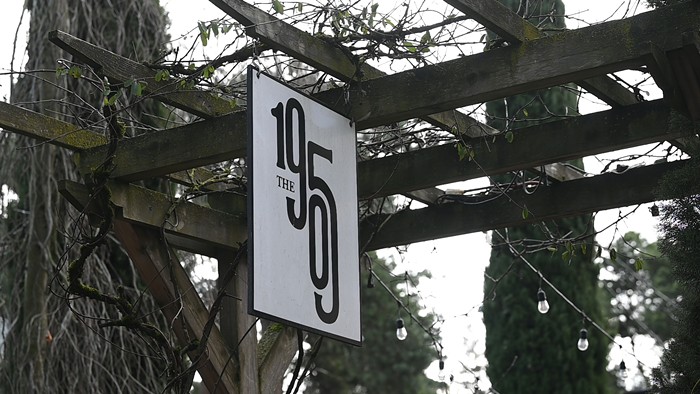IT'S A LONG TREK past the signal of any cell phone tower, through the thickets of blackberry brambles and rows of steadfast conifers, their branches draped with moss as if they've just woken up and donned their robes to greet another day. It's in this place of scarce light and near-constant mist, where GPS surrenders to a magnetized spinning arrow, that Lost Lander's Matt Sheehy spends his working hours as a forester.
"I'm by myself and it's calm, and I'm finding the minutia, these microcosmic universes that exist in the forest," Sheehy says. "And it's inspiring, because I get such a sense of wonder from being way out there, and I try to translate that into my music if I can."
It's true that no device—be it creaky weathervane or humming anemometer—can accurately measure the wily currents that fan the flames of creation; a song is the best we can do to wrangle and ride them out in three-minute spurts. Lost Lander's debut, DRRT, achieves this with certain deftness, taking care to juxtapose human instincts with technological advances. There's the organic simplicity of first-take demos in songs like "Wonderful World," along with experimental synthesis in "Afraid of Summer" and "Kangaroo," among others.
For those more empirical endeavors, Sheehy turned to producer and confidant Brent Knopf for assistance. "We have a rare working relationship. And he is so technologically minded and more detail oriented than I am. He helped me fully take the musical risks I wanted to take." In fact, when considering material for DRRT, Sheehy simply handed over a digital folder full of demos and entrusted Knopf to sift through and prioritize them. "Interestingly enough, his top two were the two songs I had no intentions of ever revisiting: 'Belly of the Bird' and 'Afraid of Summer,'" Sheehy says.
When asked why "Afraid of Summer," which is easily one of the album's standout tracks, was initially ostracized, Sheehy proceeds cautiously. "The song essentially wrote itself, and quickly. I recorded the demo in an hour, start to finish. And not to get too weird, but when I listened back to it, it sounded like somebody else. The perspective of the person in it wasn't mine, or even anything I could relate to." This perhaps explains the mood of the song, which is relatively dark compared to the record as a whole. The verse lurks oddly through a restrained picking pattern, while the chorus crescendos into a sea of wails, synths, and distorted bass over which Sheehy sings, "I'm afraid of summer/'Cause you know I can't swim." These words particularly resonate for those of us who have been caught in a riptide or a river's swift current, and the song's final refrain—an eerie repetition of the definitive phrase "You can never go home"—sufficiently evokes that moment of panic, when the concept of mortality sets in. It's four minutes of mystery, in both a physical and spiritual sense.
Aside from any supernatural concerns, the album's futuristic production, aesthetic choices, and even a few of the lyrics suggest a casual space theme. Plus, in a work of true craftsmanship, the CD jacket folds out into a pop-up planetarium! According to Sheehy, these extraterrestrial nods are very much accidental, and the reference sends him reeling into a monologue that is at once declarative and apologetic. "I never meant for this to come out in the music, but I have a life goal to eventually achieve orbit," Sheehy sheepishly says. "It's something that I think about a lot. And again, it's similar to the forest; when you start to attempt to comprehend what you're looking at, you end up with this really amazing feeling that I would love to learn how to capture and reenact.
"And the photo on our webpage—well, that was a picture I saw on Astronomy Picture of the Day, which is my homepage," Sheehy continues, laughing. "I paid the photographer $200 for the rights."
One could assume that the band's name references a destroyed spacecraft, doomed to roam the universe as one million pieces of shrapnel. Sheehy refutes this as well, saying it's a reference to a dream his late mother once had about Lost Land Lake in Wisconsin. "Lost Lander" was the best on the list of band names she had compiled for him (in addition to "Sharp Marshmallows," which clocked in at a close second), and he mentions this fact with a certain pride. For in spite of all the physical and metaphysical landscapes that Sheehy regularly treads, the sprawling scenes of human relationships—layered with memories, lessons, and ever-shifting terrain—contain the most wonderment.



















